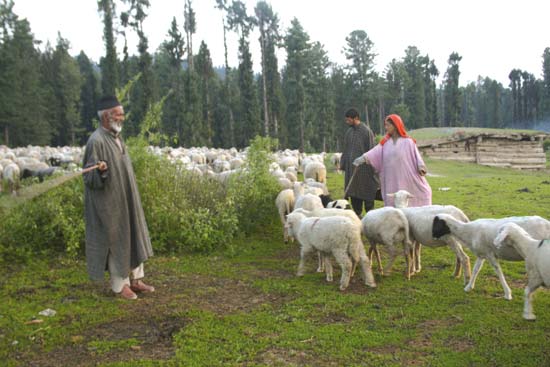
Pic: Bilal Bahadur
Unlike Zoon and Khatoon who just take care of their own herd of cows and sheep, Mushtaq and his family get paid for their services. “We charge between 275 and 300 rupees per sheep for our services,” says Mushtaq. But it is not always money that changes hands. They even accept maize, wheat, rice etc for their services. “Either a person pays the money or 15 kilograms of maize, wheat, rice etc. We accept everything,” says Mushtaq.
Wagey, who has spent his entire lifetime travelling with herds, says that the barter system was in vogue till some years ago but now people prefer money.
It is a risky business as well. If a sheep is lost then Mushtaq has to pay the owner the exact value of the lost animal. “But if it is killed by a wild animal then we just have to swear by God and the owner has to trust us. We don’t need to pay anything in that case,” says Mushtaq.
In case of death because of a disease which is common among sheep grazing at high altitudes, then Mushtaq and his family skins the sheep and feeds the meat to their dogs. “We have to present the skin to the owner as a proof. In this case we are not paid for our services as well,” says Mushtaq.
There are roaming veterinary doctors who camp at places like Heyjin and Korag-Discal along with these herdsmen.
Currently there are around fifteen other herdsmen like Mushtaq and his family who are in Heyjin with their sheep. During the night they all assemble at a single point to guard their herd from all directions from any possible danger. Tonight Mushtaq is guarding the northern end of the herd. When asked how he manages to recognize his sheep from other herdsmen’s flock, a confident smile flashes on his featureless face. “Though we use charcoal signs to distinguish between our herds, I can recognize every single sheep in my herd by just looking at its face,” says Mushtaq. “I spend almost eight months with them every year. They are like my friends. Is it possible to forget a friend’s face,” asks Mushtaq.
Every morning at the crack of dawn Mushtaq and his father start counting their flock. “We have to count them thrice a day. We cannot afford to miss even a single sheep,” says Mashtaq.
After the first round of counting is done Mushtaq and his father leaves for jungle to feed their flock. Before he left he grinned and said, “If only people know how mutton actually reaches them then they will surely value its importance.”
















Such a beautiful and touching story of friendship n survival. I like the way writer has narrated the story. Simply amazing. Thanks kashmirlife team for highlighting this side of Kashmir for its readers.
Thank you sir this story is very interested